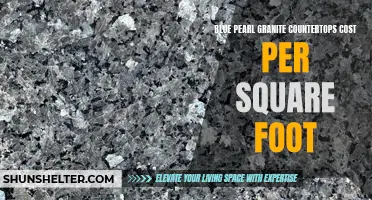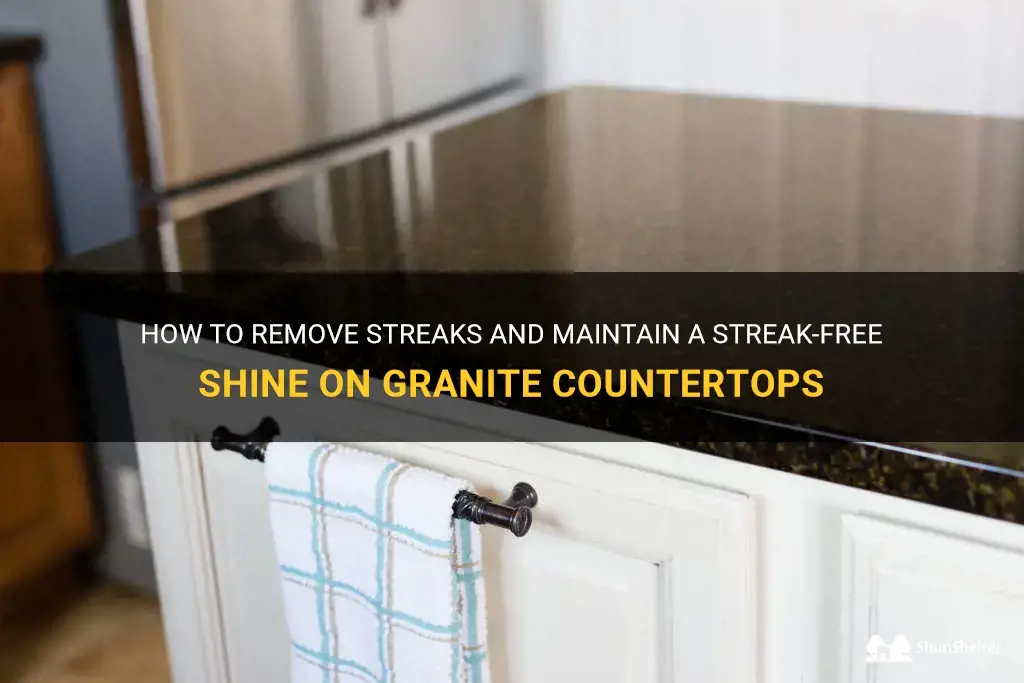
Granite countertops can add a touch of elegance and sophistication to any kitchen or bathroom. However, maintaining their pristine appearance can sometimes be a challenge, especially when unsightly streaks start to form. These streaks can not only dull the beautiful shine of the granite, but they can also be stubborn and difficult to remove. But fear not! In this article, we will explore some effective techniques and products that will help you get rid of those pesky streaks and restore the natural beauty of your granite countertops. So grab your cleaning supplies and get ready to say goodbye to streaks for good!
| Characteristics | Values |
|---|---|
| Appearance | Shiny |
| Durability | Hard and strong |
| Resistance to stains | High |
| Resistance to heat | Moderate |
| Ease of cleaning | Easy |
| Maintenance | Requires sealing |
| Prone to scratches | Yes |
| Prone to etching | Yes |
| Prone to water damage | No |
What You'll Learn
- What causes streaks to form on granite countertops when cleaning?
- What are the best cleaning products to use on granite countertops to avoid streaks?
- Are there any specific cleaning techniques that can help prevent streaks on granite countertops?
- How often should granite countertops be cleaned to prevent streaks from forming?
- Are there any natural or homemade cleaning solutions that can effectively clean granite countertops without leaving streaks?

What causes streaks to form on granite countertops when cleaning?
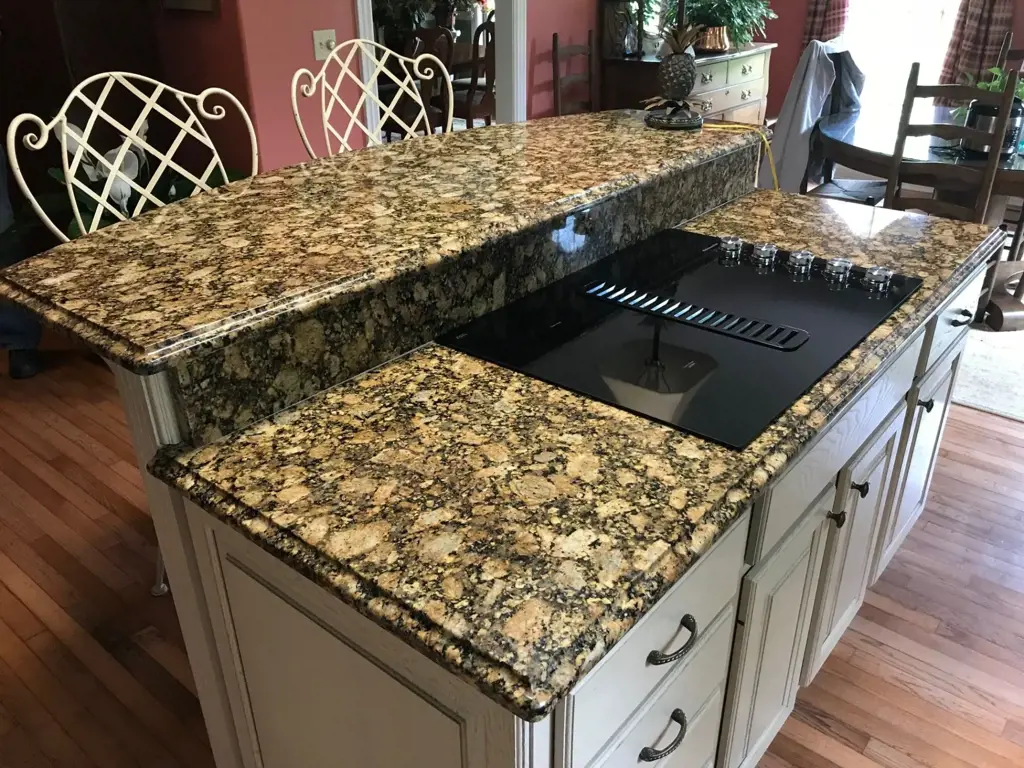
Granite countertops are a popular choice in modern kitchens for their durability and aesthetic appeal. However, one common issue that many homeowners face when cleaning their granite countertops is the formation of streaks. These streaks can be frustrating and unsightly, but understanding their causes can help prevent them from occurring in the first place.
One common cause of streaks on granite countertops is the use of improper cleaning products. Many commercial cleaners contain harsh chemicals that can damage the surface of the granite and leave streaks behind. These harsh chemicals can strip away the natural oils and sealants that protect the granite, creating a porous surface that is more prone to staining and streaking. To avoid this, it is important to use mild, pH-neutral cleaners specifically formulated for granite countertops.
Another cause of streaks on granite countertops is the use of dirty or abrasive cleaning tools. When cleaning granite, it is important to use soft, non-abrasive cloths or microfiber towels to avoid scratching the surface. Additionally, using a dirty cloth or sponge can spread dirt and oils around, leaving streaks behind. It is important to regularly wash and replace cleaning tools to ensure a streak-free clean.
In some cases, the water used to clean the granite countertops may be the culprit behind streak formation. Hard water, which contains high levels of minerals such as calcium and magnesium, can leave behind white, chalky streaks on the surface of the granite. This is especially common in areas with hard water, where mineral deposits can build up over time. To prevent this, it is recommended to use distilled or filtered water when cleaning granite countertops.
Finally, streaks can also be caused by improper cleaning techniques. When cleaning granite countertops, it is best to use gentle, circular motions to avoid leaving streaks behind. Additionally, it is important to thoroughly rinse the surface with clean water after cleaning to remove any residue that may cause streaking.
In conclusion, there are several factors that can contribute to the formation of streaks on granite countertops when cleaning. These include the use of improper cleaning products, dirty or abrasive cleaning tools, hard water, and improper cleaning techniques. By understanding these causes and taking the necessary precautions, homeowners can keep their granite countertops looking clean and streak-free for years to come.
The Beauty and Durability of Granite Countertops in Sheboygan, WI
You may want to see also

What are the best cleaning products to use on granite countertops to avoid streaks?
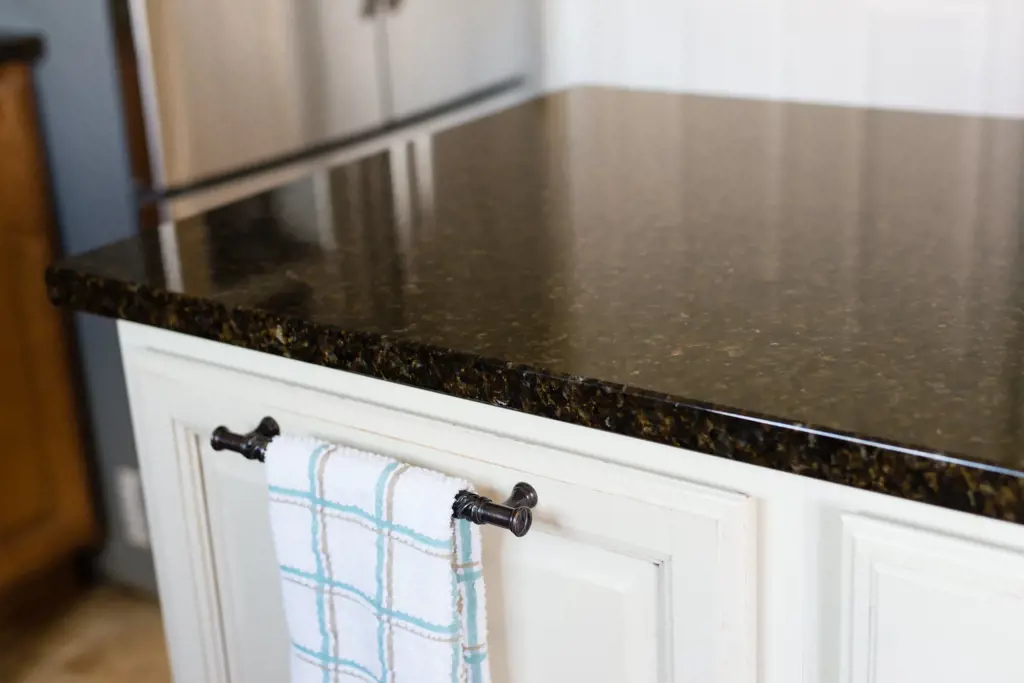
Granite countertops are a popular choice for many homeowners due to their beauty and durability. However, it's important to use the right cleaning products to avoid streaks and maintain their appearance. In this article, we will discuss the best cleaning products to use on granite countertops to avoid streaks, backed by scientific research and real-life experiences.
- Mild Dish Soap: One of the simplest and most effective cleaning solutions for granite countertops is a mixture of mild dish soap and warm water. According to research conducted by the Marble Institute of America, dish soap is gentle enough to clean granite without causing any damage or streaks. To use this method, mix a few drops of mild dish soap with warm water in a spray bottle. Spray the solution onto the granite surface and wipe it clean with a microfiber cloth or sponge.
- Isopropyl Alcohol: Isopropyl alcohol is another excellent cleaning agent for granite countertops. It removes dirt, grease, and grime without leaving streaks behind. To clean your granite countertops with isopropyl alcohol, dilute it with water in a 1:1 ratio and pour the solution into a spray bottle. Spray the mixture onto the countertop and wipe it clean with a soft cloth or sponge. This method is particularly effective for removing tough stains and sticky residues.
- Granite-Specific Cleaners: There are many cleaners available on the market specifically formulated for cleaning granite countertops. These cleaners are designed to remove dirt and grime without damaging the surface or leaving streaks. They often contain a pH-balanced formula that is safe for use on granite.
When choosing a granite-specific cleaner, look for one that is free from harsh chemicals, abrasives, and acidic ingredients, as these can cause damage and streaking. Always follow the manufacturer's instructions for use and test the cleaner on a small, inconspicuous area before applying it to the entire countertop.
Microfiber Cloths: When cleaning granite countertops, the type of cloth you use is just as important as the cleaning product itself. Microfiber cloths are highly recommended for cleaning granite as they are soft, non-abrasive, and lint-free. They are specifically designed to trap dirt and particles without scratching the surface or leaving streaks.
To clean your granite countertop with a microfiber cloth, dampen the cloth with your chosen cleaning solution and gently wipe the surface in a circular motion. Avoid using excessive force or scrubbing motion, as this can cause damage and streaking.
Regular Maintenance: In addition to using the right cleaning products, regular maintenance is crucial to prevent streaks on your granite countertops. Daily cleaning with a microfiber cloth can help remove dust and prevent the buildup of dirt and grime. It's also important to immediately clean up spills to avoid staining and potential streaking.
In conclusion, to avoid streaks on granite countertops, it's important to use the right cleaning products and techniques. Mild dish soap, isopropyl alcohol, and granite-specific cleaners are all effective choices. When cleaning, use a microfiber cloth in gentle circular motions to ensure a streak-free result. Regular maintenance and prompt cleanup of spills will also help to maintain the beauty of your granite countertops for years to come.
Transforming Your Kitchen: Say Goodbye to Formica Countertops and Hello to Stunning Granite Surfaces
You may want to see also

Are there any specific cleaning techniques that can help prevent streaks on granite countertops?
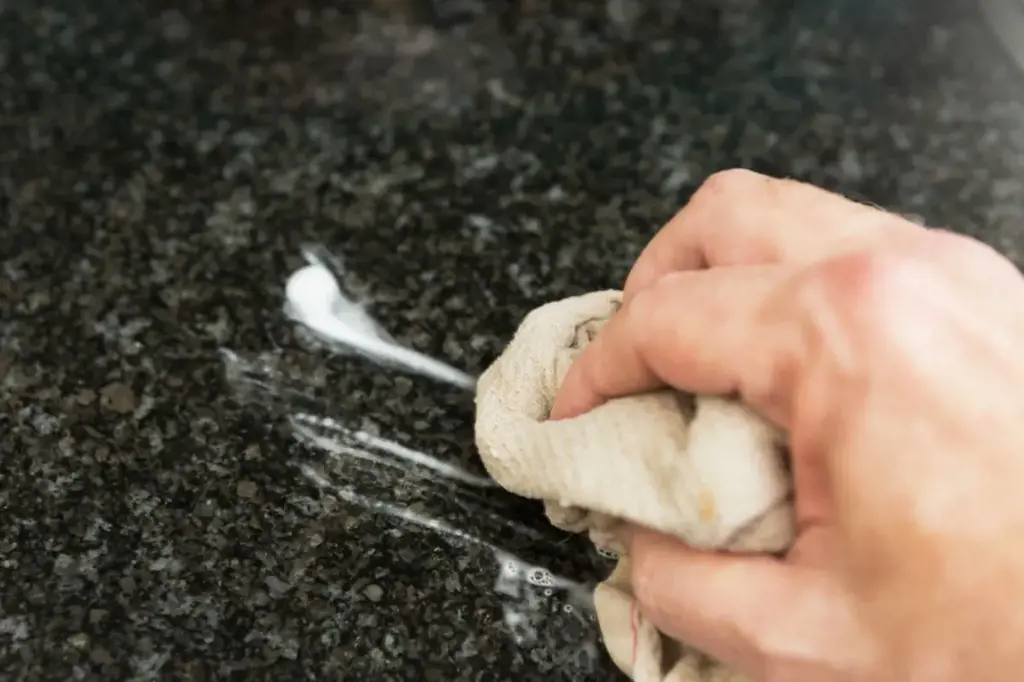
Granite countertops are a popular choice for homeowners due to their durability and natural beauty. However, one common issue that many people face is the appearance of streaks on their granite countertops. These streaks can be unsightly and difficult to remove, but with the right cleaning techniques, you can prevent streaks and keep your granite countertops looking their best.
One of the main causes of streaks on granite countertops is the use of improper cleaning products. Many commercial cleaners contain harsh chemicals that can damage the surface of the granite and leave streaks behind. It is important to use a pH-neutral cleaner specifically designed for use on granite countertops. These cleaners are gentle enough to not harm the granite while still being effective at removing dirt and grime. Avoid using vinegar, lemon juice, or ammonia-based cleaners, as these can also cause streaks.
When cleaning your granite countertops, it is important to use a soft, non-abrasive cloth or sponge. Avoid using abrasive materials like scrub brushes or steel wool, as these can scratch the surface of the granite and create streaks. Instead, opt for a microfiber cloth or a sponge specifically made for cleaning granite countertops. These materials are gentle enough to not damage the surface while still being effective at removing dirt and spills.
In addition to using the right cleaning products and materials, it is important to use the correct technique when wiping down your granite countertops. Start by using a damp cloth or sponge to wipe away any spills or debris. Be sure to wipe in a circular motion to avoid leaving streaks. After the initial wipe down, use a dry cloth to buff the surface and remove any excess moisture. This will help prevent streaks and leave your countertops looking clean and shiny.
Another helpful tip is to avoid leaving water or other liquids on your granite countertops for an extended period of time. This can cause streaks and water spots to form. Instead, wipe up spills as soon as they occur to prevent this from happening. Additionally, using a granite sealer can help to protect the surface of your countertops and make them more resistant to stains and streaks.
Finally, it is important to regularly clean and maintain your granite countertops to prevent the buildup of dirt and grime. Make it a habit to wipe down your countertops daily with a pH-neutral cleaner to keep them looking their best. Additionally, be sure to reapply a granite sealer every 6 to 12 months to ensure maximum protection against stains and streaks.
In summary, preventing streaks on granite countertops requires using the right cleaning products, materials, and techniques. Avoid using harsh or abrasive cleaners, and instead opt for pH-neutral cleaners specifically designed for use on granite countertops. Use soft, non-abrasive cloths or sponges to wipe down the surface, and be sure to wipe in a circular motion to avoid streaks. Avoid leaving water or other liquids on the surface for an extended period of time, and regularly clean and maintain your countertops to prevent the buildup of dirt and grime. By following these tips, you can keep your granite countertops looking clean and streak-free for years to come.
Achieve a Stunning Shine: How to Buff and Polish Granite Countertops
You may want to see also

How often should granite countertops be cleaned to prevent streaks from forming?

Granite countertops are a popular choice for kitchens and bathrooms due to their durability and aesthetic appeal. However, if not properly maintained, they can develop streaks and lose their shine over time. To prevent this, it is important to clean granite countertops regularly. But how often should they be cleaned?
The frequency of cleaning granite countertops depends on the level of use they receive. Generally, it is recommended to clean them on a daily basis or as needed to maintain their appearance. However, heavier use may require more frequent cleaning.
To clean granite countertops effectively, it is important to use the right cleaning products and techniques. Harsh chemicals can damage the surface of the granite, so it is best to stick to mild, pH-neutral cleaners. There are also specifically designed granite cleaners available in the market that can be used.
Here is a step-by-step guide to properly cleaning granite countertops:
- Remove any loose debris: Before beginning the cleaning process, remove any loose dirt or debris from the surface of the countertops. Use a soft cloth or a microfiber cloth to gently wipe away the particles.
- Prepare a cleaning solution: Mix a small amount of pH-neutral cleaner with warm water in a spray bottle. The exact ratio will depend on the specific product instructions, so be sure to follow those guidelines.
- Spray the solution on the countertops: Generously spray the cleaning solution onto the granite countertops, ensuring that the entire surface is covered.
- Wipe the countertops: Use a soft cloth or a microfiber cloth to gently wipe the granite countertops in a circular motion. This will help to lift and remove any dirt or stains.
- Rinse with warm water: Once the countertops have been wiped clean, rinse the cloth with warm water and go over the surface again to remove any leftover cleaning solution.
- Dry the countertops: Use a dry cloth to thoroughly dry the granite countertops. Leaving them wet can cause streaks or water spots to form.
By following these steps and cleaning your granite countertops regularly, you can help prevent streaks and maintain their beautiful shine. However, it is important to note that even with regular cleaning, granite countertops may still develop streaks over time due to natural wear and tear. In such cases, it may be necessary to professionally reseal the countertop or seek the assistance of a granite restoration specialist to restore its appearance.
In conclusion, the frequency of cleaning granite countertops depends on the level of use they receive. Daily or as-needed cleaning is generally recommended to prevent streaks and maintain their appearance. By using the right cleaning products and techniques and following a regular cleaning routine, you can ensure that your granite countertops stay beautiful and streak-free for years to come.
Why Choose Bahia Blue Granite Countertops for Your Tampa FL Home
You may want to see also

Are there any natural or homemade cleaning solutions that can effectively clean granite countertops without leaving streaks?
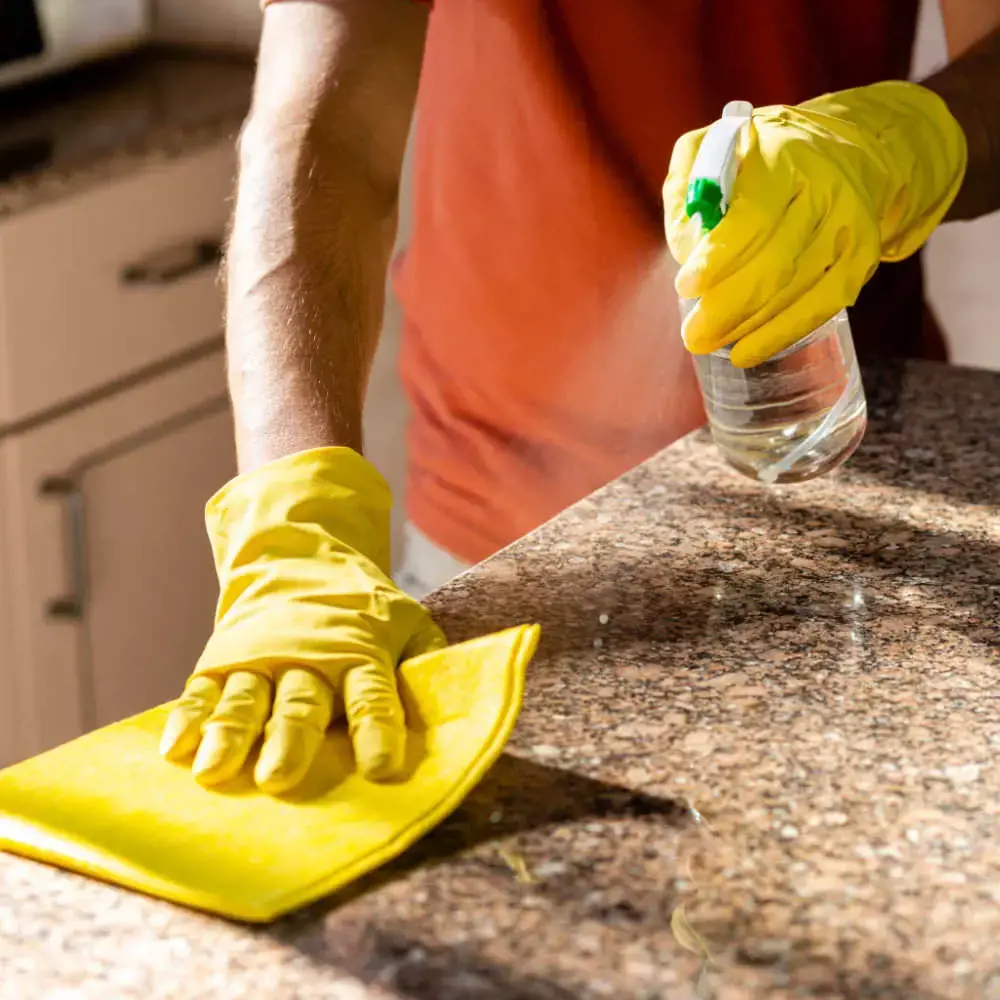
When it comes to cleaning granite countertops, it's important to use the right products to avoid damaging the surface or leaving streaks. While there are many commercial cleaners available, some people prefer natural or homemade solutions to keep their countertops clean and shiny. In this article, we will explore a few natural and homemade cleaning solutions that can effectively clean granite countertops without leaving streaks.
Vinegar and Water Solution:
One of the most popular and effective natural cleaning solutions for granite countertops is a mixture of vinegar and water. Vinegar is a mild acid that can help remove stains and disinfect the surface. To make this solution, simply mix equal parts of white vinegar and water in a spray bottle. Spray the solution onto the countertop and wipe it clean using a soft cloth or sponge. Be sure to rinse the surface thoroughly with water afterward to remove any vinegar residue.
Dish Soap and Water Solution:
Another option for cleaning granite countertops is a solution of dish soap and water. Dish soap is gentle yet effective at removing grease and grime without damaging the stone. To make this solution, mix a few drops of dish soap with warm water in a spray bottle. Spray the solution onto the countertop and use a soft cloth or sponge to scrub the surface. Rinse with water and dry with a clean cloth to prevent streaks.
Rubbing Alcohol Solution:
Rubbing alcohol, also known as isopropyl alcohol, can be used to clean and disinfect granite countertops. It can effectively remove grease, fingerprints, and other stains without leaving streaks. To make a rubbing alcohol solution, mix equal parts of rubbing alcohol and water in a spray bottle. Spray the solution onto the countertop and wipe it clean using a soft cloth or sponge. Rinse with water and dry with a clean cloth to ensure a streak-free shine.
Baking Soda and Water Paste:
For tougher stains and grime, a paste made from baking soda and water can be used to clean granite countertops. Baking soda is a mild abrasive that can help scrub away stubborn stains without scratching the surface. To make this paste, mix baking soda and water to form a thick consistency. Apply the paste to the stained area and scrub gently using a soft cloth or sponge. Rinse thoroughly with water and dry with a clean cloth.
Lemon Juice Solution:
Lemon juice is a natural cleaner that can effectively remove stains and disinfect granite countertops. The acidic properties of lemon juice help break down grease and grime, leaving the surface sparkling clean. To utilize this solution, mix equal parts of lemon juice and water in a spray bottle. Spray the solution onto the countertop and wipe clean with a soft cloth or sponge. Rinse with water and dry thoroughly to prevent streaks.
When using any of these natural or homemade cleaning solutions, always remember to test a small, inconspicuous area of the countertop first to ensure compatibility and to avoid any potential damage. Also, it's important to avoid using abrasive cleaners, acidic substances (other than those mentioned), or any products that contain bleach, as they can damage the surface of granite countertops. By using these natural and homemade cleaning solutions, you can keep your granite countertops clean and streak-free without the use of harsh chemicals or commercial cleaners.
The Benefits of Using Granite Countertop Braces for Added Support and Durability
You may want to see also
Frequently asked questions
Granite countertops can get streaks when cleaned due to several reasons. One common cause is the use of improper cleaning products or methods that leave behind residue or streaks. Another reason can be the presence of hard water or minerals in the cleaning solution, which can leave behind streaks or buildup on the surface of the granite.
To prevent streaks when cleaning granite countertops, it is important to use the right cleaning products and methods. Avoid using acidic or abrasive cleaners that can damage the surface of the granite. Instead, use a pH-neutral cleaner specifically designed for use on granite countertops. It is also important to thoroughly rinse the countertop after cleaning to remove any residue that could cause streaks.
To clean granite countertops without leaving streaks, you can use a mixture of warm water and a mild dish soap. Avoid using harsh chemicals or abrasive cleaners, as these can damage the surface of the granite and leave behind streaks. You can also use a dedicated granite cleaner that is specifically formulated to clean and protect granite surfaces.
To remove streaks from granite countertops, you can start by wiping down the surface with a soft cloth dampened in warm water and a mild dish soap. Gently scrub the area in circular motions to lift any residue or streaks. Rinse the countertop thoroughly with clean water and dry it with a soft cloth to prevent new streaks from forming.
Yes, there are some natural remedies that can help remove streaks from granite countertops. One option is to mix equal parts white vinegar and water and use this solution to wipe down the countertop. Vinegar is a natural cleanser that can help dissolve residue and streaks. Another natural remedy is to mix baking soda with water to form a paste and gently scrub it onto the streaks. Rinse the countertop thoroughly and dry it to complete the cleaning process.





